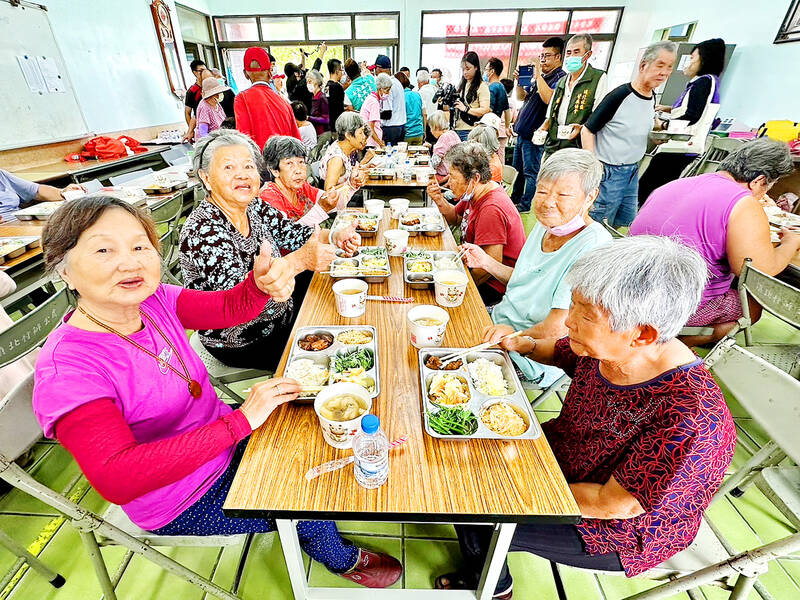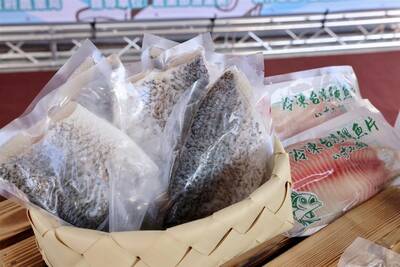Hsinchu City and Hsinchu County were the only two “young” administrative areas nationwide, with an aging index of less than 100, while Chiayi County was the oldest, the latest data from the Ministry of the Interior showed.
The aging index measures the number of people aged 65 or older for every 100 people under the age of 15.
An administrative area would be considered “young” if it has an aging index less than 100 — meaning there are more young people than elderly people — and “old” if otherwise.

Photo: Tsai Tsung-hsun, Taipei Times
Ministry data showed the national aging index had exceeded 100 in 2017, due to an aging society with fewer children, and soared to 163.67 last year.
Taichung’s and Taoyuan’s aging indices surpassed 100 in 2021 and 2022 respectively, the data showed.
Last year, Hsinchu City had an aging index of 99.45, while Hsinchu County’s was 95.69, the ministry said, adding that the areas could also reach 100 by the end of this year, leaving Taiwan without a “young” city or county.
The oldest administrative area was Chiayi County, with an aging index of 276.29, followed by Kinmen County’s 232.16, Keelung’s 224.53, Nantou County’s 214.33, Pingtung County’s 208.61 and Penghu County’s 207.41, the data showed.
On average, one would not see a child without seeing two elderly people when walking around those cities and counties, the ministry said.
The data also showed that the pressure on people aged between 15 and 64 — the working-age population, or the “sandwich generation” — was highest from 1959 to 1965, as national dependency ratios during that period were 90 percent or higher.
That means each person who was of working age at the time had to support dependents who were mainly children, the ministry said.
For example, the national young age dependency ratio in 1965 was up to 85.53 percent, while the national old age dependency ratio was 5.05 percent, with an aging index of 5.9, they said.
However, the young age dependency ratio declined to 16.96 percent last year, while the old-age dependency ratio rose to 27.76 percent, with the national aging index reaching a record 163.63, they added.
On the city and county level, Taipei was the only administrative area last year with a dependency ratio greater than 50 percent, followed by Nantou County at 46.81 percent and Yunlin County at 46.44 percent, the data showed.
Taipei also had the greatest mortgage affordability ratio of more than 71 percent last year, much higher than that of other administrative areas, placing the city’s “sandwich generation” under the biggest pressure in supporting dependents, the ministry said.
Additionally, the ministry’s data showed that trends of late marriage or staying single would be difficult to reverse in Taiwan.
While up to 70 percent of women born from 1961 to 1970 already had a spouse when they were aged 20 to 29, and 60 percent of those born from 1971 to 1980 did as well, only 17.21 percent of women born after 1995 — who are below 30 years old — had a spouse as of last year, it showed.
Even women aged 30 to 34 who had a spouse made up only 40 percent, while less than half of women who were younger than 35 were willing to get married, the data showed.
Men born from 1961 to 1970 had an average first marriage age of 28.2 and women 24.8, but the figures surpassed 32 for men and 31 for women last year, both marking the latest first marriage age, it showed.
With increased women’s autonomy and social changes, their marriage rate dropped to less than 50 percent in 2016 and 48.1 percent last year from more than 60 percent in the 1980s, the data showed.
The downward trend gets steeper with younger age groups, it showed.
Up to 22.9 percent to 34.6 percent of women born from 1961 to 1970 were married at the age of 20 to 24, but the figure decreased to 3.84 percent for women at the same age interval last year, the data showed.
The marriage rate for women aged 25 to 29 also plunged to a new low of 17.21 percent last year, it showed.
The crude marriage rate dipped to 5.26 thousandth last year, higher only than the 5.16 thousandth and 4.88 thousandth in 2020 and 2021 respectively, when the COVID-19 pandemic was rampant, indicating a growing trend of being single by choice, the data showed.

Taiwan's Vice President Hsiao Bi-khim (蕭美琴) said Saturday that she would not be intimidated by the Chinese Communist Party (CCP), following reports that Chinese agents planned to ram her car during a visit to the Czech Republic last year. "I had a great visit to Prague & thank the Czech authorities for their hospitality & ensuring my safety," Hsiao said on social media platform X. "The CCP's unlawful activities will NOT intimidate me from voicing Taiwan's interests in the international community," she wrote. Hsiao visited the Czech Republic on March 18 last year as vice president-elect and met with Czech Senate leadership, including

There have been clear signs of Chinese Communist Party (CCP) attempts to interfere in the nationwide recall vote on July 26 in support of Chinese Nationalist Party (KMT) legislators facing recall, an unnamed government official said, warning about possible further actions. The CCP is actively involved in Taiwanese politics, and interference in the recall vote is to be expected, with multiple Chinese state media and TAO attempts to discredit the Democratic Progressive Party (DPP) and undermine public support of their recall movement, the official said. This interference includes a smear campaign initiated this month by a pro-Beijing Hong Kong news outlet against

A week-long exhibition on modern Tibetan history and the Dalai Lama’s global advocacy opened yesterday in Taipei, featuring quotes and artworks highlighting human rights and China’s ongoing repression of Tibetans, Hong Kongers and Uighurs. The exhibition, the first organized by the Human Rights Network for Tibet and Taiwan (HRNTT), is titled “From the Snowy Ridges to the Ocean of Wisdom.” “It would be impossible for Tibetans inside Tibet to hold an exhibition like this — we can do it. because we live in a free and democratic country,” HRNTT secretary-general Tashi Tsering said. Tashi Tsering, a Taiwan-based Tibetan who has never

A first shipment of five tons of Taiwan tilapia was sent from Tainan to Singapore on Wednesday, following an order valued at NT$600,000 (US$20,500) placed with a company in the city. The products, including frozen whole fish and pre- cooked fish belly, were dispatched from Jiangjun Fishing Harbor, where a new aquatic processing and logistics center is under construction. At the launch, Tainan Mayor Huang Wei-che (黃偉哲) called the move a “breakthrough,” marking Taiwan’s expansion into the Singaporean tilapia market. Taiwan’s tilapia exports have traditionally focused on the United States, Canada, and the Middle East, Huang said, adding that the new foothold in